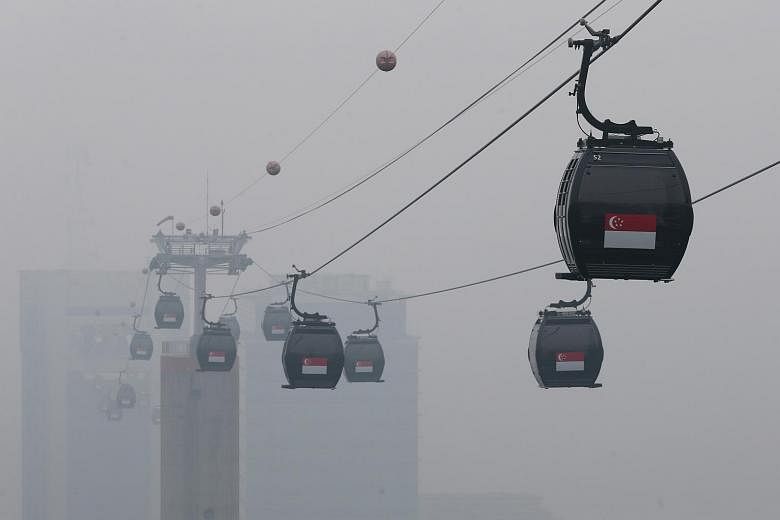The seriousness of out-of-control burning activities in Indonesia continues to be felt in the region despite efforts to put out fires.
Experts say more must be done to punish offenders, or the haze problem will not go away.
Among their suggestions are harsher fines, rewards for informants, more policing and closer cooperation among the authorities.
Some also suggest a procurement policy that ensures goods and services are obtained from sustainable and responsible sources.
Singapore Management University (SMU) law don Eugene Tan said: "The law should require the Government to take the lead and adopt (such a procurement policy).
"This can help (ensure) its investments and business partners are not engaging in conduct that is detrimental to the health of Singaporeans and our economy."
He was referring to Singapore's Transboundary Haze Pollution Act, which was passed in Parliament last year to punish those responsible for causing or condoning fires if burning results in unhealthy levels of haze in Singapore.
"It would be the height of irony if the haze was caused, directly and indirectly, by companies with a strong Singaporean connection, whether in terms of ownership or investments by Singapore entities," said Associate Professor Tan.
A Singapore-listed firm is under investigation for causing forest fires in Indonesia, an Indonesian official said on Tuesday.
Singapore's Ministry for the Environment and Water Resources is also investigating two recent breaches of the Transboundary Haze Pollution Act.
Those found guilty under the Act can be fined up to $100,000 a day, capped at a total of $2 million, for causing unhealthy haze, defined as a 24-hour Pollutant Standards Index value of 101 or greater for 24 hours or more.
But Professor Ng Yew-Kwang, an economist from Nanyang Technological University, said the fines were too low and suggested that they be increased by at least a hundred times. "Some may think that $100,000 a day is a big penalty. However, since the haze affects all people in Singapore, that sum is less than two cents a day per person," he pointed out. "This is certainly far less than 1 per cent of any reasonable estimate of the costs of haze at any unhealthy level."
National University of Singapore economist Ivan Png said the law could include a whistle-blower provision to reward those with information leading to convictions. "Whistle-blowers have been instrumental in exposing white-collar and environmental crime in the United States and Europe. We can apply the same concept to combat the haze.
"We might then even get the help of local government officials and plantation workers in Sumatra. The prospect of a whistle-blower reward worth perhaps hundreds of thousands of dollars would certainly focus their minds," said Professor Png, who suggested a reward 12 times the informant's annual income.
Meanwhile, a spokesman for non-governmental environmental organisation World Wide Fund for Nature Singapore said the biggest difficulty with the new law was verifying who started the fires, which depends on Jakarta's capacity to monitor the ground. She added: "It will also depend on the Act's ability to target smaller companies suspected of causing fires, (and) to follow the supply chain to the giant corporations they supply."
Dr Nigel Sizer, global director of the forests programme at US-based think-tank World Resources Institute, and SMU law professor Mahdev Mohan called for greater dialogue between governments, firms and environmental groups which "may have an accurate lay of the land", as a way of solving the haze issue made complicated by Indonesia's complex, often overlapping land ownership and usage rights.
The experts agree that while the law may be a step in the right direction, it does not yet have any bite. As SMU's Prof Tan put it: "It's small comfort to most Singaporeans... plagued by the scourge of the haze and for which the law strikes them as being a paper tiger."

